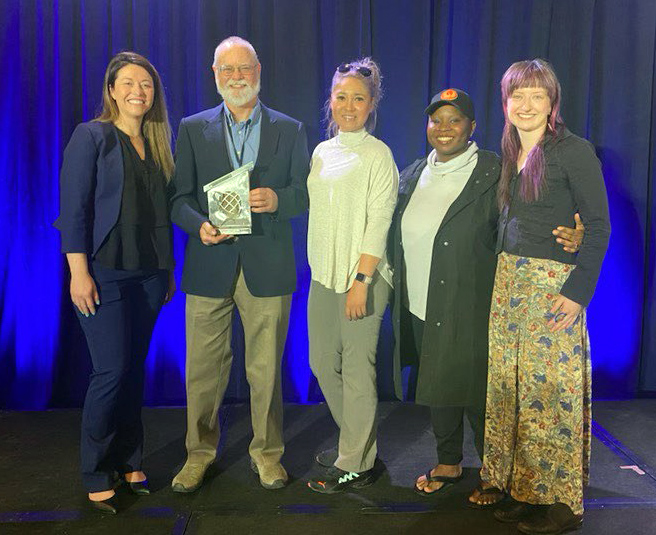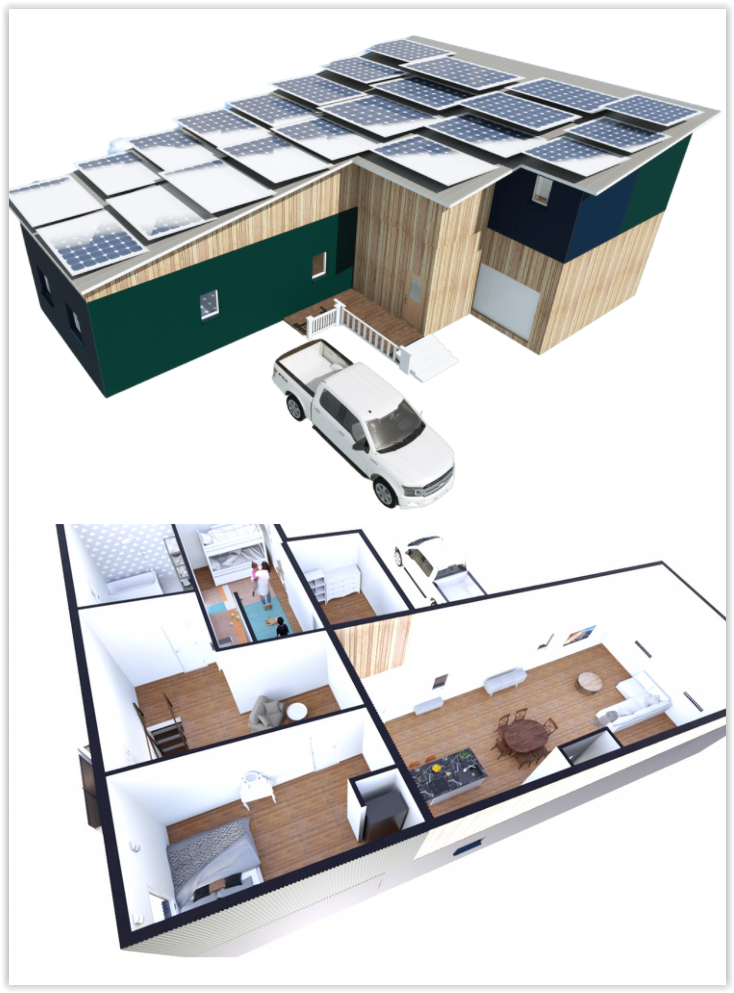UAF team lauded for innovative home design

Members of UAF's Solar Decathlon Challenge team, from left, Amanda TûÑrdal, assistant professor Mark Mastellar, Deilah Johnson, Aihs Palmer and Meg Waite.
Jeff Richardson
907-474-6284
May 26, 2022
Using shipping containers and energy-efficient techniques, a team of University of ···§Ç¨û§ Fairbanks students has created a prize-winning new design for rural ···§Ç¨û§ housing construction.
The four students in the Solar Design Challenge class offered through the UAF Bristol Bay Campus were among the top entries at an ···§Ç¨û§ competition sponsored by the National Renewable Energy Laboratory in April. Later this summer, they hope to convince officials that their design could ease a housing shortage in Nome.
Team Asriavik ã which means ãblueberryã in Inupiaq ã includes students Deilah Johnson, Aihs Palmer, Amanda TûÑrdal and Meg Waite. When the team claimed third place in the New Housing Division at NRELãs Solar Decathlon in Golden, Colorado, last month, it was the first time theyãd been in the same room together. The far-flung group, which includes students in Fairbanks, Illinois and Oregon, met online throughout the spring semester.
The inspiration for their design came from Johnson, a 2019 alumna of the Bristol Bay Campusã sustainable energy program and the environmental coordinator for the Village of Solomon. Many displaced Solomon residents moved to Nome following a school closure in the 1950s, and they continue to face challenges finding housing in the area.
ãWhen she said they needed housing and this could be a real-world application, I could tell a lot of the other student team members got excited,ã said assistant professor Mark Masteller, who taught the class through the Bristol Bay Campus sustainable energy program. ãThey wanted to do something that somebody wanted to build, that could actually be useful in the world.ã
The design combines practicality and efficiency. The structureãs skeleton is made of shipping containers, an abundant resource in Nome thanks to freight deliveries. That framework is surrounded with timber construction and built with features that include a 15-kilowatt solar system on the roof, air-source heat pumps, triple-pane windows and R-61 insulation.

A graphic illustration shows Team Asriavik's entry in NREL's Solar Decathlon. The effort took third place in the New Housing division of the ···§Ç¨û§ competition.
The ···§Ç¨û§ Center for Energy and Power and the Cold Climate Housing Research Center helped evaluate the design.
The three-bedroom home is also made to be functional for the climate and lifestyle in Nome. It features a post-and-beam foundation, a game-processing room and an Arctic entry. The design details led judges to announce at the awards ceremony that the UAF students understood their climate better than any other team.
Designs in the Solar Decathlon are ãzero-energy buildings,ã which the U.S. Department of Energy defines as a structure that produces as much energy as it consumes during a year. Estimated annual energy costs would be just $240 a year, with construction expenses of as little as half of the $500-per-square-foot costs typical in Nome.
Team Asriavikãs entry was UAFãs first in the Solar Decathlon competition. They faced an ···§Ç¨û§ field of 26 entries, including the winning team from Sydney, Australia.
The UAF team hopes the next step is to make their design a reality for Solomon tribal members living in Nome.
Johnson will propose the design to tribal officials this summer, with hopes that homes could be approved for construction in 2023.
Although it can be difficult to use nonstandard designs in government housing projects, Masteller believes the studentsã work will ultimately make a difference for local residents.
ãEven if the design isnãt accepted, it could convince them that a low energy-consumption building is plausible in that area,ã he said.
The project was supported by the ···§Ç¨û§ Native-Serving and Native Hawaiian-Serving Institutions Education Competitive Grants Program from the USDA National Institute of Food and Agriculture.
ADDITIONAL CONTACTS: Mark Masteller, mamasteller@alaska.edu; Aihs Palmer, rapalmer3@alaska.edu.
159-22


